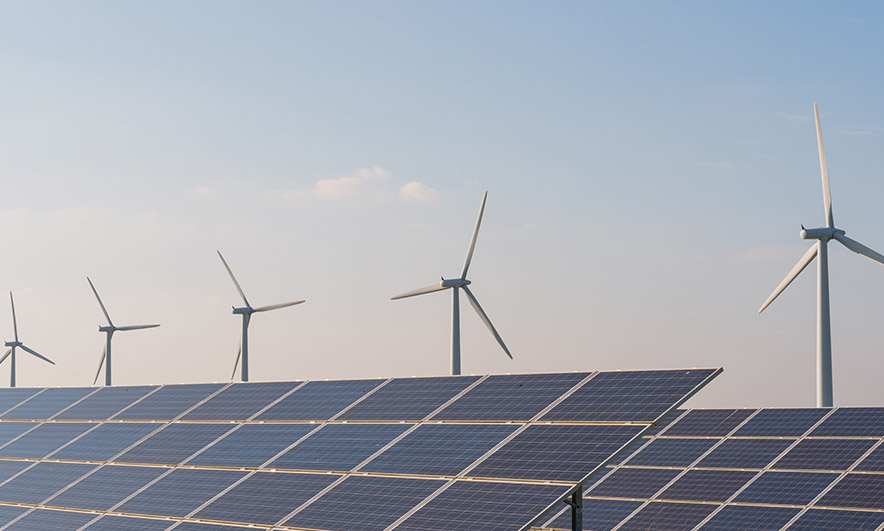The new 2030 EU Renewables Target

Negotiators from the EU Commission, Parliament and Council have reached an ambitious agreement to increase the renewable energy target for 2030 to 32%. This represents a 5% increase from its previous target of 27%. The agreement also includes an upwards revision clause by 2023.
The agreement will allow Europe to continue to fight against climate change and to meet the goals set by the Paris Agreement. It is hoped that the agreement will also lead to opportunities of stimulated investment, job creation, improved skills, and industry innovation.
The new agreement – at a glance
The new agreement:
- sets a new, binding, renewable energy target for the EU for 2030 of 32%, including a review clause by 2023 for an upward revision of the EU level target.
- improves the design and stability of renewables support schemes.
- provides the opportunity to streamline and reduce administrative procedures in this sector.
- establishes a clear and stable regulatory framework on self-consumption.
- increases the level of ambition for the transport and heating/cooling sectors.
- improves the sustainability of the use of bioenergy.
Commissioner for Climate Action and Energy, Miguel Arias Cañete, said: "Renewables are good for Europe, and today, Europe is good at renewables. This deal is a hard-won victory in our efforts to unlock the true potential of Europe's clean energy transition. This new ambition will help us meet our Paris Agreement goals and will translate into more jobs, lower energy bills for consumers and less energy imports. I am particularly pleased with the new European target of 32%. The binding nature of the target will also provide additional certainty to the investors".
Renewables and the EU
The Renewable Energy Directive is part and parcel of the implementation of the Juncker Commission priorities, which takes its name from the EU president, Jean-Claude Juncker.
The Renewable Energy Directive priorities are to build "a resilient Energy Union and a forward-looking climate change policy". The Commission aims to make the EU the leader in clean energy transition. For this reason, the EU has committed to cut CO2 emissions by at least 40% by 2030, while continuing to modernise the EU's economy and delivering on jobs and growth for all European citizens.
To achieve this aim, the Commission is guided by three main goals:
- prioritising energy efficiency;
- achieving global leadership in renewable energies; and
- providing a fair deal for consumers.
The EU aims to lower its dependence on imported fossil fuels and to make its energy production more sustainable by boosting renewable energy, which can be produced from a wide variety of sources including wind, solar, hydro, tidal, geothermal, and biomass. The renewable energy industry also drives technological innovation and employment across Europe.
What has the EU achieved so far?
The EU has already adopted several measures to grow renewable energy in Europe, including:
- the EU's Renewable Energy Directive from 2009, which set a binding target of 20% final energy consumption from renewable sources by 2020. To achieve this, EU countries have committed to reaching their own national renewables targets, ranging from 10% in Malta to 49% in Sweden. They are also each required to have at least 10% of their transport fuels come from renewable sources by 2020.
- all EU countries have adopted national renewable energy action plans that show how they intend to meet their renewables targets. These plans include sectorial targets for electricity, heating and cooling, and transport; planned policy measures; the different mix of renewables technologies they expect to employ; and the planned use of cooperation mechanisms.
Next steps
Now that the agreement has been reached, the text of the Directive will have to be formally approved by the European Parliament and the Council. Once endorsed by both co-legislators in the coming months, the updated Renewable Energy Directive will be published in the Official Journal of the Union and will enter into force 20 days after publication. Member States will have to transpose the new elements of the Directive into national law 18 months after its entry into force.
What does this mean for the UK?
Whether or not the Directive will apply to the UK depends on the outcome of EU negotiations. However, the news has been largely positively received, with the CEO of the Solar Trade Association, Chris Hewett, stating the European Union: “understands how vital it is to empower everyday people and organisations to invest in solar power. The measures the EU will put into law in 18 months’ time should give much-needed confidence to the UK solar & storage industries that the playing field between small investors and the traditional industry is starting to level. We urge the UK Government to follow suit and provide a level playing field for diverse investors in solar power as soon as possible.”